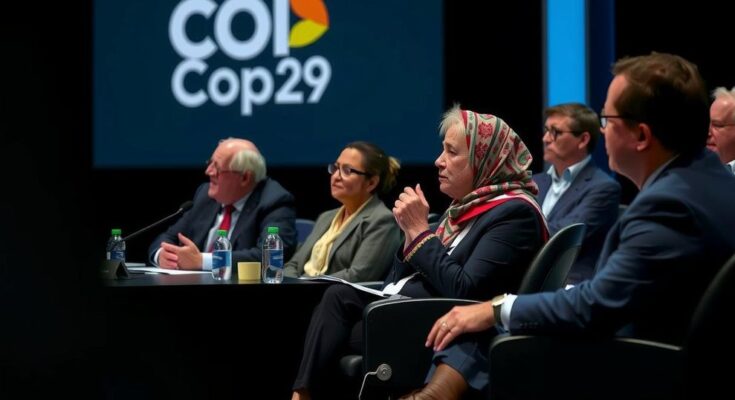COP29 in Baku highlights the urgent need for developed economies to prioritize human welfare over profits in climate finance negotiations, particularly in light of recent natural disasters in Spain that underscore the escalating impacts of climate change. Developing nations urgently require trillions in support, but negotiations have stalled due to indecisiveness among wealthier countries, emphasizing a potential crisis in global climate action.
In response to the alarming consequences of climate change, particularly as evidenced by devastating flood events in Spain, it is essential for developed economies to address climate finance negotiations with a sense of urgency and moral responsibility. The ongoing COP29 discussions in Baku aim to establish a new climate finance deal as an upgrade to the previously agreed $100 billion annual contributions which were only recently fulfilled in 2022, after considerable delay. The need now is explicitly clear: developing nations require upwards of $5.8 trillion by 2030 to effectively tackle climate adversity, necessitating decisive action from wealthier nations. However, negotiations surrounding this New Collective Quantified Goal (NCQG) are plagued by hesitation and indecision, particularly from developed nations, who seem to be using the discussions to shift the burden of contributions onto emerging economies, such as China. Such moves threaten the integrity of international agreements like the Paris Accord and showcase a lack of commitment to the principals of climate justice. Additionally, reliance on private sector funding for climate adaptation projects undermines the urgent need for public, grant-based financial support, leaving vulnerable nations at a disadvantage. It is imperative that developed countries understand their responsibilities in resolving this crisis and prioritize humanitarian needs over profit-driven motives. The situation is increasingly pressing, with millions around the globe spending more on debt servicing than essential services like healthcare and education. Should developed economies neglect to deliver substantial aid structured to alleviate the climate crisis, the global community may face severe consequences both environmentally and socially. Thus, this crucial moment at COP29 must be met with bold leadership, securing commitments that will safeguard the future for those most impacted by climate change. The window of opportunity for impactful, effective climate finance is rapidly closing, and the world is watching the actions of these nations closely.
The COP29 climate negotiations are taking place against a backdrop of intense scrutiny following severe natural disasters attributed to climate change, notably the recent flash floods in Spain which resulted in over 200 fatalities. The urgency of establishing a new climate finance framework is underscored by prior failures to meet climate funding commitments, showcased by the belated achievement of the $100 billion target. The current discussions emphasize the dire need for developed nations to take substantive actions in supporting climate initiatives for developing countries, amid rising expectations for financial accountability and sustainability.
In summary, the responsibility of developed countries in the context of climate finance negotiation is unequivocal. The necessity for substantial, grant-based financial assistance to developing nations is imperative to counteract the urgent challenges posed by climate change. As COP29 unfolds, developed economies must prioritize the well-being of global communities over profit motives, or risk failing their commitment to international climate agreements and the principles of climate justice.
Original Source: www.aljazeera.com




